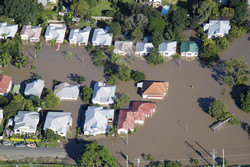Knowledge sharing mitigates disaster risk
An EU-funded initiative explored key aspects related to knowledge management with regard to risk reduction and disaster mitigation integrated with climate change adaptation strategies. Natural hazards such as flooding or earthquakes can have disastrous societal, environmental and economic impacts. Disaster risk reduction (DRR) is an approach to lessen hazard damage by, for example, reducing exposure, increasing preparedness and giving early warning of impending events. Effectively implementing DRR requires widespread knowledge dissemination to international agencies, governments, disaster planners and civil society organisations. The KNOW-4-DRR(opens in new window) (Enabling knowledge for disaster risk reduction in integration to climate change adaptation) project sought to mitigate disasters by investigating how this knowledge is created and shared. Through workshops and seminars, the consortium identified barriers to disseminating knowledge. It also improved bridges for sharing information across a range of players. In addition, researchers established living labs, which involved national, interregional and local decision-makers in Italy, Spain and Vietnam. In these case studies, disasters in each country were used as laboratories for testing and applying disaster responses and management decisions in real-life situations. The case studies comprised a well-balanced sample of different scales (national, interregional and local) at which decisions are made and where therefore, different stakeholders from all social groups in the knowledge management framework are considered. These activities are aimed at tackling crucial issues such as uncertainty factors in decisions involving risks and crises, knowledge flow and use by different experts and the wider public. They also addressed the effect of the current financial crisis in Europe on knowledge management and decision-making for DRR. The living labs enabled KNOW-4-DRR to build models and tools for collecting, mapping and evaluating impacts from disasters. These models will be used to build a knowledge database supporting the multidisciplinary and multi-agency work needed during the different phases of a disaster response. Since climate change may increase the severity and frequency of hazards, KNOW-4-DRR also integrated climate change adaptation (CCA) within the broad DRR concept. CCA requires taking appropriate action, such as improving water efficiency, adapting building codes or building flood defences, in anticipation of extreme weather events. KNOW-4-DRR will help to ensure that EU Member States, particularly those most affected by climate change, can limit the socioeconomic impact of natural disasters.







